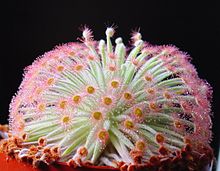- Drosera subg. Lasiocephala
-
Lasiocephala Drosera derbyensis, a member of subgenus Lasiocephala Scientific classification Kingdom: Plantae (unranked): Angiosperms (unranked): Eudicots (unranked): Core eudicots Order: Caryophyllales Family: Droseraceae Genus: Drosera Subgenus: Lasiocephala
(Planch.) J.SchlauerType species D. petiolaris
R.Br. ex DC.Species Drosera banksii
Drosera brevicornis
Drosera broomensis
Drosera caduca
Drosera darwinensis
Drosera derbyensis
Drosera dilatato-petiolaris
Drosera falconeri
Drosera fulva
Drosera kenneallyi
Drosera lanata
Drosera ordensis
Drosera paradoxa
Drosera petiolarisSynonyms - D. sect. Lasiocephala Planch.
- D. ser. Lasiocephala (Planch.) Diels
Drosera subg. Lasiocephala, sometimes collectively known as the petiolaris-complex,[1] is a subgenus of 14 species in the genus Drosera. These species are distinguished by their subpeltate to peltate lamina.[2]
The subgenus was first formally described by Jules Émile Planchon in 1848 as a section.[3] Planchon included the species D. banksii in his arrangement, but it has been argued that D. banksii belongs in a clade with the more-closely allied D. subtilis.[1] Ludwig Diels reclassified the genus in his 1906 monograph of the family and recognizing this taxon as a series under section Rossolis.[4] In 1996, taxonomist Jan Schlauer argued for the recognition of this taxon at the rank of subgenus, noting that these closely related species share many affinities with subgenus Drosera but are different enough to warrant subgeneric status.[2] All species in this subgenus are native to northern Australia except for D. petiolaris, which is more widely distributed to as far as New Guinea. The plants in this subgenus or petiolaris-complex mostly look like variations of the eponymous D. petiolaris.[1]
See also
References
- ^ a b c Rice, B. A. (2008). The Carnivorous Plant FAQ v. 11.5. Accessed online: 21 June 2010.
- ^ a b Schlauer, J. 1996. A dichotomous key to the genus Drosera L. (Droseraceae). Carnivorous Plant Newsletter, 25(3):67-88.
- ^ International Organization for Plant Information (IOPI). "Plant Name Search Results" (HTML). International Plant Names Index. http://www.ipni.org/ipni/idPlantNameSearch.do?id=129581-3. Retrieved 21 June 2010.
- ^ International Organization for Plant Information (IOPI). "Plant Name Search Results" (HTML). International Plant Names Index. http://www.ipni.org/ipni/idPlantNameSearch.do?id=129639-3. Retrieved 21 June 2010.

This Droseraceae article is a stub. You can help Wikipedia by expanding it.

